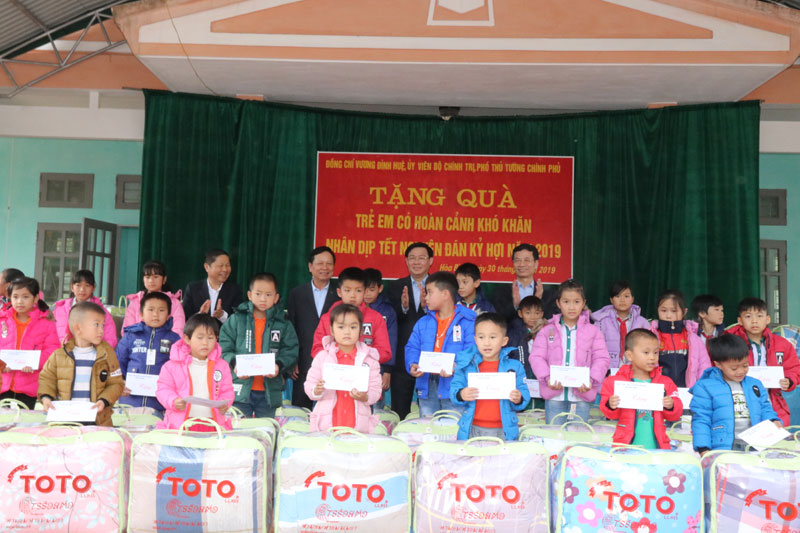
(HBO) – On the occasion of the lunar New Year (Tet) festival, Politburo member and Deputy Prime Minister Vuong Dinh Hue on January 30 led a delegation to visit and present gifts to poor households and disadvantaged children in Hoa Binh province.
The
delegation included member of the Party Central Committee and Minister of
Information and Communications Nguyen Manh Hung, and officials of the Ministry
of Labour, Invalids and Social Affairs, the Government Office and the Vietnam
Fatherland Front Central Committee, together with member of the Party Central
Committee and Secretary of the provincial Party Committee Bui Van Tinh and Vice
Secretary of the provincial Party Committee and Chairman of the People’s
Committee Nguyen Van Quang.

Deputy Prime Minister Vuong Dinh Hue
and leaders of ministries and sectors and Hoa Binh province present gifts to
disadvantaged households in Thung Nai commune, Cao Phong district.
In
Thung Nai and Binh Thanh communes of Cao Phong district, Deputy PM Hue presented
100 gift packs worth 1.3 million VND (56 USD) each to poor households, and 300
gift packs worth 500,000 VND each to underprivileged students. Leaders of Hoa
Binh province also granted 100 presents worth 1.3 million VND each to local
poor families.
Having
expressed his sympathy with the poor living conditions of disadvantaged
households in the two communes, Hue emphasised that the Party and State’s
policy is to ensure all Vietnamese people can enjoy a warm Tet. Therefore, over
the past years, the Party, State, social organisations, and individual donors
have paid particular attention to caring for those less fortunate during the
Tet holidays.
Priority
has been given to improving not only the material, but also spiritual life of
people, especially those living in disadvantaged circumstances.
He
added that the State is speeding up agricultural restructuring, new-style rural
area building, production development, and job generation in rural areas, thus
raising the living standards of local people.
The
Deputy PM asked local Party organisations and authorities to continue
supporting poor households and policy beneficiaries, and to encourage them to
exert efforts to overcome their difficulties.
On
this occasion, he extended his best wishes to all officials, people and
labourers in Hoa Binh province, hoping that they continue doing their utmost to
gain better achievements in labour and production./.
In the spirit of "Party members go first, the people follow”, all households of Party members in the Doan Ket sub-region in Da Bac town, Da Bac district, voluntarily removed gates and fences, and donated land when the road expansion project passed through their properties. Inspired by their example, 68 households in the sub-region quickly followed suit, contributing over 1,400 sq.m of residential and perennial cropland to widen the main road through the residential area. The exemplary role of Party members in Doan Ket stands as a shining example of studying and following President Ho Chi Minh’s thought, morality, and lifestyle.
The Hoa Binh provincial People's Committee held a monthly meeting on May 29 to assess the implementation of socio-economic development tasks in the first six months of 2025, the progress of key projects, and some other important issues.
During his lifetime, President Ho Chi Minh always expressed his deep affection and special concern for children and youth. He once emphasized: "Caring for and educating children well is the responsibility of the entire Party and the entire people”; "First of all, the family (i.e. grandparents, parents, siblings) must do this job well”. "the Party Committees…, the Children’s Committee, the Youth Union, the education sector, and all related organizations must have specific plans to ensure children grow healthier and more progressive”. His teachings has been remaining valuable and serving as the guiding principles in the work of protecting, caring for, and educating children. In line with this ideology, Hoa Binh Province has continuously been prioritizing and investing resources in the well-being of children in recent years.
Mr. Nguyen Phi Long, the alternate Member of the Party Central Committee and Secretary of the Provincial Party Committee chaired the meeting of the Standing Committee of the Provincial Party Committee to provide opinions on several investment projects within the province. There was the attendance of Ms. Bui Thi Minh, the Permanent Deputy Secretary of the Provincial Party Committee and Chairwoman of the Provincial People’s Council; Mr. Bui Đuc Hinh, the Deputy Secretary of the Provincial Party Committee and Chairman of the Provincial People’s Committee and other members of the Standing Committee; the leaders from other departments, agencies, and some localities.
The Standing Board of the Vietnam Fatherland Front (VFF) Committee of Hoa Binh province held a meeting on May 28 to honour outstanding village elders, village heads, and reputable individuals from local ethnic minority and religious communities.
In mid-May, the provincial Museum organised an exhibition named "Duoi la co Dang Cong san Viet Nam quang vinh” (Under the flag of the glorious Communist Party of Vietnam). This meaningful activity took place in the joyful atmosphere to celebrate the country's major holidays and the Party congresses at all levels for the 2025-2030 term, towards the 14th National Party Congress.



